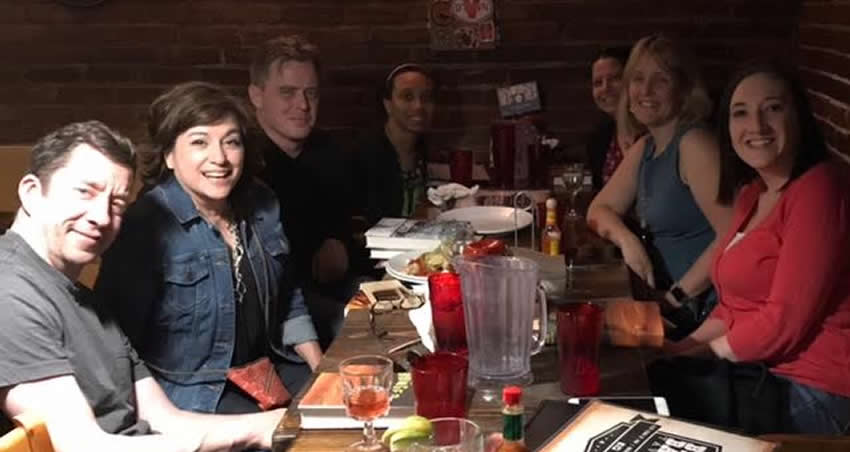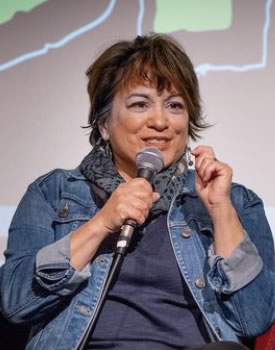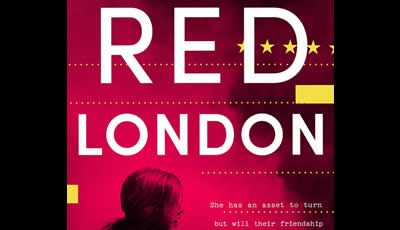

Between The Lines Between the Lines: Alma Katsu
Revealing the Complex Emotions of Ambition
As a college student studying writing with John Irving, Alma Katsu dreamed of becoming an award-winning novelist. But she couldn’t have imagined that the fulfillment of those dreams would come after a decades-long detour into the world of intelligence agencies and espionage.
“It was a fluke, really,” Katsu says. “I was looking for an experience that was completely different from what I knew from my small world. When I got the job, I didn’t expect to stay more than a couple years, but it was so interesting and varied that I stayed for an entire career.”
The intelligence community isn’t noted for its transparency, and Katsu’s writing went on the back burner as she worked as a senior analyst at several federal agencies, advising policymakers and military commanders on issues of national security. It was only after she was struck by “a mysterious illness” in her forties that Katsu started writing fiction again. It was a way to take her mind off her worries, but it soon became more. She says, “I enjoyed it so much that I decided to get back into it seriously. Ten years later (!) I sold my first book (The Taker) and got yet another whole new life.”
The Taker exploded on the scene with a place on Booklist’s top ten debut novel list. It was the first of a paranormal trilogy, and over the next few years, Katsu wrote several more paranormal novels, including The Hunger, a horror novel that gave a supernatural twist to the historical tragedy of the Donner party.
Still, it was only a matter of time until her years in intelligence tugged at her creative brain. The result was Red Widow, her first spy novel and what she calls “the logical marriage of her love of storytelling with her 30-plus-year career in intelligence.” Red Widow introduced Lindsey Duncan—smart, strong, capable . . . and immensely human.
Lindsey returns in Katsu’s latest offering, RED LONDON. This complex, character-driven suspense novel intersperses Lyndsey’s story with that of Emily Rotenberg, the wife of an oligarch. Through a series of plot twists and ethical dilemmas, the book explores betrayal, false (and not-so-false) friendships, disillusionment, morality, and above all, ambition.
“Both of the issues in RED LONDON—the Russian oligarchs and the rise of private intelligence—are about ambition, and ambition is a very revealing emotion,” Katsu says. “I remember what it was like when the Soviet Union disintegrated. It was a scary, lawless time. The men who grabbed as many state resources as possible eventually became the oligarchs with the blessing of the new regime. It made me wonder what it would be like to be married to one of them, what these women would do to remain in their sphere of power.
“As for the second topic, private intelligence has been hiring away people like myself—trained in state-level spy tradecraft—to work for wealthy individuals, private companies, even foreign governments. It appeals to intelligence professionals who feel they’re not getting the opportunities they deserve, but then they find themselves in this new world where they may be asked to do something unethical or perhaps illegal. Again, a great dilemma for a character.”
It’s these ethical and moral implications that make the book memorable. Asked what she hopes readers will take from it, she says, “I aspire, like John le Carré, to show the demands and the moral issues faced by the people who work in intelligence. To show the effect that tremendous pressure—and influence—has on people who started out with good intentions. I’ve worked alongside some incredibly fine people who sacrificed personal gain in order to serve their countrymen (like Lyndsey), and some who became warped and destructive—and couldn’t see what they’d let themselves become.”
There are unique challenges to writing a book set in the intelligence community.
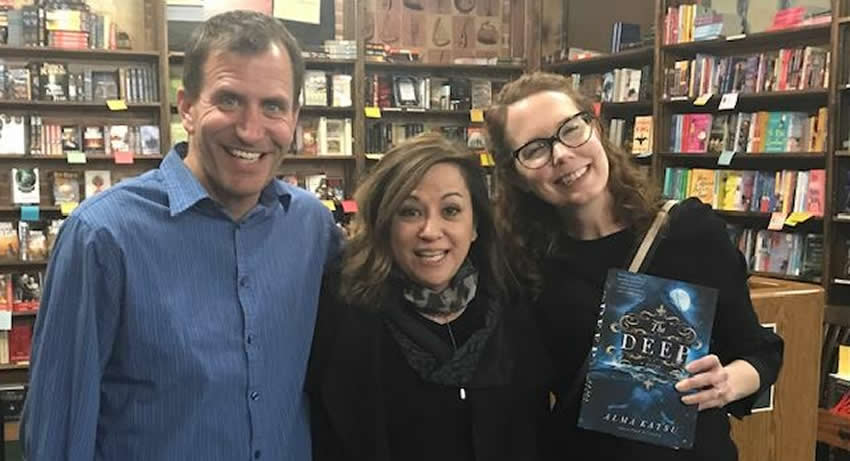
Dave and Laura Medicus, hosts of the weekly book podcast The Inside Flap, host an event for Katsu at the Tattered Cover bookstore in Denver.
“When you get a security clearance, you sign a non-disclosure agreement (NDA) where you agree to give the agency that issued the clearance the opportunity to review any work that has to do with your time in service that you intend to make public,” Katsu says. “The reviewing agency is supposed to look for inadvertent mentions of classified information. It sounds cut-and-dried but it’s a little more subjective than it appears. I’ve been lucky so far in that I haven’t had any issues.”
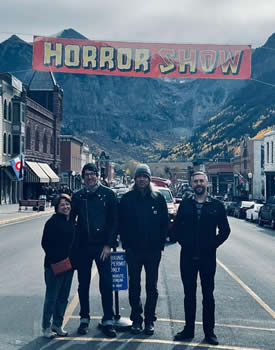
Katsu at the Telluride Horror Show with Paul Tremblay, Stephen Graham Jones, and Jeremy Robert Johnson.
RED LONDON, however, presented a different challenge. Katsu had to rewrite much of the book after Russia’s 2022 invasion of Ukraine. “The book I’d outlined looked at the threat of a Russian attack,” she says. “Once the invasion happened, there was a new, more visceral reality and readers wouldn’t be content with a mere threat anymore.”
As an analyst, she had experienced more than one civil war and knew it would be impossible to keep up with the swiftly changing circumstances. “You can’t write a novel that way!” she says. “I had to think of a way to get ahead of what was happening in real life—and I’m proud of how I did this, but readers will just have to pick up the book to find out.”
Katsu’s knowledge of world events and spycraft make for a believable and compelling spy novel. The book’s ending is especially satisfying. In one interview, Katsu advised writers to remember that the ending has to be a total surprise. “After you’ve finished your outline, go back and make it 100 percent trickier. And then 100 percent trickier again.”
Asked how an aspiring thriller writer might accomplish this, Katsu says, “The question I ask myself for scenes that are proving elusive is to ask, ‘what’s the worst thing that could happen?’ for the POV character. Then write that scene. The part that takes some work is imagining not just bad, but the worst, most catastrophic thing possible. Usually, you get some interesting developments that can push your book in an unforeseen direction.”
She goes on to offer another gem: “Don’t settle for ‘good enough.’ Often, in the beginning, our goal is to just get published, so we write a book that’s like the ones we read to learn about the genre. But breaking into the business is hard and it’s not enough to be just ‘okay.’ I try to read a wide range of books, particularly challenging books, because those are the ones that will inspire me to do better, to transcend mediocrity (the pull of which is like gravity: difficult to overcome).”
Asked for an example of a book she loves, Katsu answers, “The Swimmers by Julie Otsuka, a beautiful, touching story about dementia, first through a woman’s own experience, then through her daughter’s perception of that character. The thing that strikes you first is the strange construction: the first part is written in the collective POV (using ‘we’) and the second part is written in the second (‘you’). It’s a striking, effective use of two uncommon POVs, a case study in moving writing.”
Naturally, Katsu already has a new book of her own in the works. RED LONDON ends with a delicious teaser for the next Lindsey Duncan book. Of the upcoming project, Katsu says, “I love writing Theresa Warner, the ‘Red Widow’ of the first book in the series, and so I’m thrilled to get the chance to write her again. There’s so much left to explore: what’s going on with her husband, returned from three years in a Russian prison; and of course, what’s going to happen with the two men in Lyndsey’s life, the hunky but dangerous Russian double agent she’s handling, and the British spy who may or may not be playing her.”
- Kim Harrison - March 15, 2024
- Lisa Malice - December 15, 2023
- Jim Butcher - November 13, 2023




